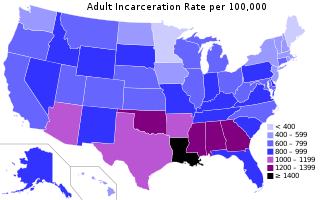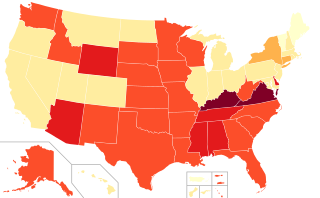Measure 11, also known as "One Strike You're Out", was a citizens' initiative passed in 1994 in the U.S. State of Oregon. This statutory enactment established mandatory minimum sentencing for several crimes. The measure was approved in the November 8, 1994 general election with 788,695 votes in favor, and 412,816 votes against.
Prison Fellowship is the world's largest Christian nonprofit organization for prisoners, former prisoners, and their families, and a leading advocate for justice reform.

Incarceration in the United States is a primary form of punishment and rehabilitation for the commission of felony and other offenses. The United States has the largest prison population in the world, and the highest per-capita incarceration rate. In 2018 in the US, there were 698 people incarcerated per 100,000; this includes the incarceration rate for adults or people tried as adults. In 2016, 2.2 million Americans have been incarcerated, which means for every 100,000 there are 655 who are currently inmates. Prison, parole, and probation operations generate an $81 billion annual cost to U.S. taxpayers, while police and court costs, bail bond fees, and prison phone fees generate another $100 billion in costs that are paid by individuals.

The war on drugs is a global campaign, led by the U.S. federal government, of drug prohibition, military aid, and military intervention, with the aim of reducing the illegal drug trade in the United States. The initiative includes a set of drug policies that are intended to discourage the production, distribution, and consumption of psychoactive drugs that the participating governments and the UN have made illegal. The term was popularized by the media shortly after a press conference given on June 18, 1971, by President Richard Nixon—the day after publication of a special message from President Nixon to the Congress on Drug Abuse Prevention and Control—during which he declared drug abuse "public enemy number one". That message to the Congress included text about devoting more federal resources to the "prevention of new addicts, and the rehabilitation of those who are addicted", but that part did not receive the same public attention as the term "war on drugs". However, two years prior to this, Nixon had formally declared a "war on drugs" that would be directed toward eradication, interdiction, and incarceration. In 2015, the Drug Policy Alliance, which advocates for an end to the War on Drugs, estimated that the United States spends $51 billion annually on these initiatives, and in 2021, after 50 years of the drug war, others have estimated that the US has spent a cumulative $1 trillion on it.
The Law Enforcement Action Partnership (LEAP), formerly Law Enforcement Against Prohibition, is a U.S.-based 501(c)(3) nonprofit group of current and former police, judges, prosecutors, and other criminal justice professionals who use their expertise to advance drug policy and criminal justice solutions that enhance public safety. The organization is modeled after Vietnam Veterans Against the War. As of April 2017, they have more than 180 representatives around the world who speak on behalf of over 5,000 law enforcement members and 100,000 supporters.
The Prison Policy Initiative (PPI) is a criminal justice oriented American public policy think tank based in Easthampton, Massachusetts. It is a non-profit organization, designated 501(c)(3) by the IRS. It is the "leading public critic" of the United States Census Bureau's practice of counting prisoners as residents of the towns where they are incarcerated, and has conducted research in several states proving that this practice results in distortion of equal representation.

Race in the United States criminal justice system refers to the unique experiences and disparities in the United States in regard to the policing and prosecuting of various races. There have been different outcomes for different racial groups in convicting and sentencing felons in the United States criminal justice system. Experts and analysts have debated the relative importance of different factors that have led to these disparities.

In September 2013, the incarceration rate of the United States of America was the highest in the world at 716 per 100,000 of the national population; by 2019 it had fallen to 419 per 100,000. Between 2019 and 2020, the United States saw a significant drop in the total number of incarcerations. State and federal prison and local jail incarcerations dropped by 14% from 2.1 million in 2019 to 1.8 million in mid-2020. While the United States represents about 4.4 percent of the world's population, it houses around 22 percent of the world's prisoners. Corrections cost around $74 billion in 2007 according to the U.S. Bureau of Justice Statistics.
Race is one of the correlates of crime receiving attention in academic studies, government surveys, media coverage, and public concern.
The War on Drugs is a term for the actions taken and legislation enacted by the US federal government, intended to reduce or eliminate the production, distribution, and use of illicit drugs. The War on Drugs began during the Nixon administration with the goal of reducing the supply of and demand for illegal drugs, but an ulterior racial motivation has been proposed. The War on Drugs has led to controversial legislation and policies, including mandatory minimum penalties and stop-and-frisk searches, which have been suggested to be carried out disproportionately against minorities. The effects of the War on Drugs are contentious, with some suggesting that it has created racial disparities in arrests, prosecutions, imprisonment, and rehabilitation. Others have criticized the methodology and the conclusions of such studies. In addition to disparities in enforcement, some claim that the collateral effects of the War on Drugs have established forms of structural violence, especially for minority communities.

The Fair Sentencing Act of 2010 was an Act of Congress that was signed into federal law by United States President Barack Obama on August 3, 2010 that reduces the disparity between the amount of crack cocaine and powder cocaine needed to trigger certain federal criminal penalties from a 100:1 weight ratio to an 18:1 weight ratio and eliminated the five-year mandatory minimum sentence for simple possession of crack cocaine, among other provisions. Similar bills were introduced in several U.S. Congresses before its passage in 2010, and courts had also acted to reduce the sentencing disparity prior to the bill's passage.

The New Jim Crow: Mass Incarceration in the Age of Colorblindness is a book by Michelle Alexander, a civil rights litigator and legal scholar. The book discusses race-related issues specific to African-American males and mass incarceration in the United States, but Alexander noted that the discrimination faced by African-American males is prevalent among other minorities and socio-economically disadvantaged populations. Alexander's central premise, from which the book derives its title, is that "mass incarceration is, metaphorically, the New Jim Crow".
The Smarter Sentencing Act of 2013 is a bill in the United States Senate that focused on limited federal resources and amends the federal criminal code to direct the court to impose a sentence for specified controlled substance offenses without regard to any statutory minimum sentence if the court finds that the criminal history category for the defendant is not higher than category two.

Felony disenfranchisement in the United States is the suspension or withdrawal of voting rights due to the conviction of a criminal offense. The actual class of crimes that results in disenfranchisement vary between jurisdictions, but most commonly classed as felonies, or may be based on a certain period of incarceration or other penalty. In some jurisdictions disfranchisement is permanent, while in others suffrage is restored after a person has served a sentence, or completed parole or probation. Felony disenfranchisement is one among the collateral consequences of criminal conviction and the loss of rights due to conviction for criminal offense. In 2016, 6.1 million individuals were disenfranchised on account of a conviction, 2.47% of voting-age citizens. As of October 2020, it was estimated that 5.1 million voting-age US citizens were disenfranchised for the 2020 presidential election on account of a felony conviction, 1 in 44 citizens. As suffrage rights are generally bestowed by state law, state felony disenfranchisement laws also apply to elections to federal offices.
Rights restoration is the process of restoring voting rights to people with prior felony convictions who lost their voting rights under felony disenfranchisement. It may also refer to additional civil rights that are taken away upon conviction, such as holding public office and serving on a jury.

Criminal justice reform addresses structural issues in criminal justice systems such as racial profiling, police brutality, overcriminalization, mass incarceration, and recidivism. Reforms can take place at any point where the criminal justice system intervenes in citizens’ lives, including lawmaking, policing, sentencing and incarceration. Criminal justice reform can also address the collateral consequences of conviction, including disenfranchisement or lack of access to housing or employment, that may restrict the rights of individuals with criminal records.
Marc Mauer is the executive director of the Sentencing Project, a group that advocates for criminal justice reform and addressing racial disparities in the United States criminal-justice system.
Felony disenfranchisement in Florida is currently a contentious political issue in Florida. Though the general principle of felony disenfranchisement is not in dispute, the disenfranchisement of people who had been convicted of a felony and have served their sentence — that includes prison, bail and parole — but continue being barred from voting if they have outstanding fines, fees or restitution obligations is in contention. Prior to January 8, 2019, when Amendment 4 came into effect, people convicted of a felony effectively lost their right to vote for life, as it could only be restored by the governor as an act of clemency, which rarely occurred. Florida was one of four states with a lifetime ban, the others being Iowa, Kentucky and Virginia.

The First Step Act (FSA), formally known as the Formerly Incarcerated Reenter Society Transformed Safely Transitioning Every Person Act, is a bipartisan criminal justice bill passed by the 115th Congress and signed by President Donald Trump in December 2018. The First Step Act, among other changes, reforms federal prisons and sentencing laws in order to reduce recidivism, decrease the federal inmate population, and maintain public safety.

Decarceration involves government policies and community campaigns to reduce the number of people held in custody or under custodial supervision in the United States. Decarceration, the opposite of incarceration, also entails reducing the rate of imprisonment at the federal, state and municipal level. Home to 5% of the global population but 25 percent of its prisoners, the U.S. possess the world's highest incarceration rate: 655 inmates for every 100,000 people, enough inmates to equal the populations of Philadelphia or Houston.









